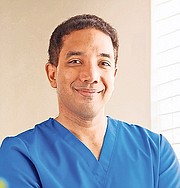By Dr GREGGORY PINTO
The human papillomavirus (HPV) is the most widespread sexually transmitted infection (STI). Most men do not know that HPV can potentially be a cancer causing infection. Nearly 35 thousand men and women are diagnosed every year in the United States with HPV related cancers.
Almost all men and women who are sexually active and not vaccinated for HPV will have HPV at some time in their lives, according to the Centre for Disease Control and Prevention (CDC). Men can get HPV through vaginal, oral or anal sex with an infected individual. Most HPV infections clear up on their own within a few months of becoming infected, and nearly 90 percent of HPV infections would be cleared up within two years.
There are more than 100 types of HPV and about 40 of them are sexually transmitted. Each of the types of HPV is assigned a number and they are categorized as low risk or high risk. Low risk HPV strains may produce no symptoms or possibly cause warts on your penis, scrotum, anus or back of your throat and they often resolve on their own without long term side effects.
High-risk HPV may lead to cell changes that may lead to various types of cancer such as penile cancer, throat and esophageal cancer and anal cancer in men. According to the CDC 60 percent of penile cancers and 90 percent of cervical cancers affecting women, are caused by HPV.
There is currently no way to test for HPV in men but there are ways to test for the symptoms of HPV in men such as genital warts and HPV related cancers.
In 2006 the HPV vaccine became available to girls, teens and young adult women and consequently the HPV rate in American teens had reduced by 56 percent by 2013. The HPV vaccine was only approved for use in females until 2009. The current recommendation by the CDC is for two doses of the HPV vaccine be given to boys and girls between 9 and 12 years old, and three doses be given over a six month period to all boys and girls after the age of 15 up to the age of 26 years old.
In October 2018, the US Food and Drug Administration (FDA) approved the use of the HPV vaccine in men and men aged 27 to 45 years old.
There is debate in the medical community regarding the use of HPV vaccines in men over the age of 26 years old. There is a clear medical consensus that all adolescent boys will benefit from receiving the HPV vaccine. A man of any age that has no HPV symptoms of warts or genital, anal, throat or esophageal cancer, should benefit from receiving the vaccine.
However, if a man has been sexually active and not always used a condom then it is likely that they will have HPV and there will be less benefit in receiving the HPV vaccine.
Unfortunately, worldwide there are more HPV vaccine outreach and education efforts directed at adolescent females and their parents. There is a widely accepted lack of education regarding the benefits of HPV vaccinations for boys, male adolescents, and young men up to the age of 45.
The best mode of protection against men getting HPV is using a condom every time and receiving the HPV vaccine. A man may not develop an HPV related cancer but they may transmit HPV to their female partner who may develop a cancer secondary to HPV. You cannot get HPV from a toilet seat or swimming in a pool or coming into contact with blood from an HPV infected individual. HPV is spread through vaginal, anal and oral sex. It is spread through skin to skin contact.
There are 3 HPV vaccines Cervarix, Gardasil and Gardasil 9, which prevent cancers and diseases related to nine types of HPV. Approximately 92 percent of HPV related cancers can be prevented by the HPV vaccine.
Education and awareness are important keys in the prevention of HPV related diseases and cancers in both men and women. The HPV vaccine is readily available to females and males ages 9 to 45 and it may prevent HPV related cancer for the individual or their future sexual partners. Men use a condom every time and practice monogamy.
Seek comprehensive, confidential and compassionate urological care.
• Dr Greggory Pinto is a Bahamian urologist who has trained in South Africa, Germany, France and India. He is a member of the European Association of Urologists. Dr Pinto can be reached at Urology Care Bahamas at the Surgical Suite, Centreville Medical Centre, Collins Avenue and Sixth Terrace. Call 326 1929, e-mail welcome@urologycarebahamas.com, or visit www.urologycarebahamas.com.





Comments
Use the comment form below to begin a discussion about this content.
Sign in to comment
OpenID